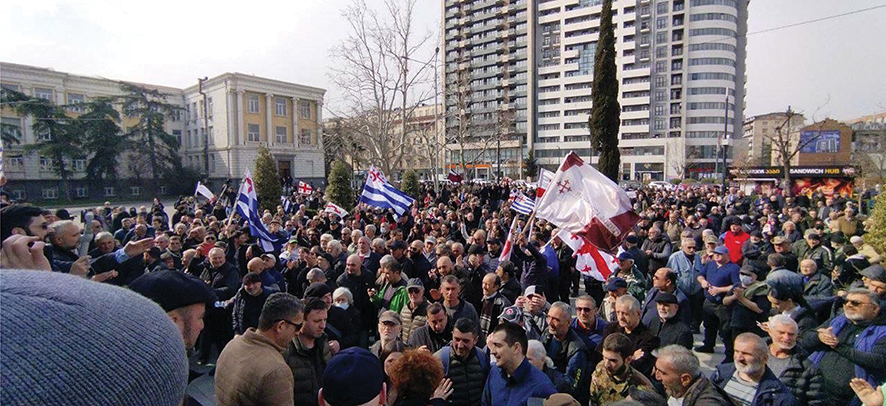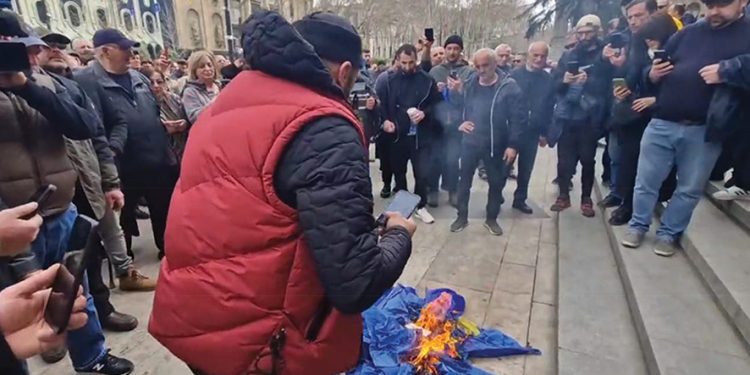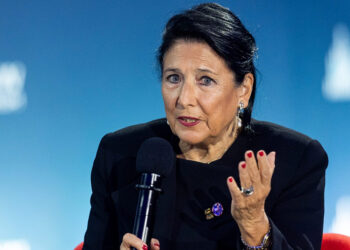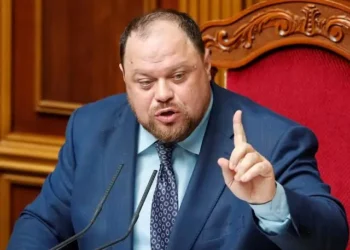For two nights the area around Georgia’s Parliament shook with the shouts of the crowds and the booms of police riot weapons. With the eyes of Europe upon them, the protestors resisted the advances of the ruling party to enact laws against the will of the people. When the gas and crowds cleared, the bill had been rescinded back to the dark depths from whence it came.
However, not all were elated at the victory the people had wrought from the jaws of defeat. Contrary to the natural growth pattern the country is poised to follow, there lies another group staunchly determined to derail it. Consisting of largely the older male generation of the country, a loose conglomeration of far-right and ultra-traditionalist parties seek to thwart Georgia’s European aspirations and revert it back to its place in the Soviet Union.
Leading these groups is the Conservative Movement, a political entity founded by Alt-Info in 2021 with the aim “to establish Christian democracy instead of liberal democracy in Georgia,” party chairman Zurab Makharadze stated. Despite claiming to represent the majority of Georgians, the political party has never held any seats in Parliament nor won any electoral races since its inception. Its geopolitical views have been succinctly described as pro-Russian and anti-European.
Most infamously, the group was allegedly the mastermind of the assaults on Tbilisi Pride protestors, police, and the press in the July 2022 events near Parliament. Sources close to the group have revealed that some of the group’s expenses, including web design and hosting of their websites, were paid for by Russian bank accounts. Unsurprisingly, the members are rarely shy to disclose their desire to see the nation return under the purview of the Kremlin.
However, rather than confront the protestors on the two nights that rattled the government so much so as to withdraw their legislation, the group gathered during the working day – a day when most working people would be away and gainfully employed. Starting at the Georgian Technical University, claiming the organization was up to no good, they left after finding their jeers falling on deaf ears. Their next target would be Parliament.
Finding no suitable soft targets to engage, they turned their attention to the European Union flag flying above the square. While police rushed to halt the predations of the group, they managed to tear it down, relishing their victory at burning it in front of their own government building. Shota Martynenko, the leader of the Conservative Movement took to the stage, issuing his demands as passersby continued about their day.

His demands were as ludicrous as the scene they had made with the EU flag. They demanded that the people facing justice for their assaults in 2022 be released, the people responsible for overturning the ‘foreign agent’ law by protest be arrested (something he referred to as a coup), and that the matter of the foreign agent bill be decided by popular referendum. Makharadze, making an appearance to publicly confess to the desecration of the EU flag, also stated that there would be no war or revolution in the country because his aging and seemingly jobless group of followers kneel before “our father” and that “Georgia is above all”.
Despite not being entirely clear on what a coup actually is, he is also woefully unprepared for the results should a popular referendum be held. Georgia has routinely polled in the high 70s to high 80s when asked about integration into European social and political bodies. According to an IRI poll in 2022, “85% of Georgians either “fully support” or “somewhat support” joining the alliance. Among those who support joining the EU, 60% support joining even if it means cutting trade relations with Russia.”
“Citizen demand for joining the European Union remains very high,” Steve Nix, Senior Director for Eurasia at IRI, said in a report. “Georgians’ desire to join the EU has been remarkably consistent in previous surveys, and this new poll reinforces that position.” To drive this point further, a National Democratic Institute (NDI) and CRRC Georgia poll in 2023 shows that EU support has grown to 81%, indicating Georgian citizens’ unwavering support for European integration.”
Thus invites the question; why do these groups gain a following and persist? Their recruitment is based on the routine misinformation peddled out of the Kremlin, only recently enhanced as its military flounders in the Ukrainian mud. It is also, far more sadly, a form of weaponized religion and perverted religious-political beliefs.
Using the imagery of the most radical and isolated instances of “European liberalism,” as well as the threat that they will bring this into their homes, they target vulnerable men. Many of these are either without jobs or are in lower wage positions, making them easy for exploitation. When these methods don’t work, they resort to false characterizations about the effects EU integration would have on the nation.
The use of religion is, and has been for some time by Russia, a tool to pry people away from any pro-Western stance. The alleged infallibility of the Church, or more accurately its very-human clergy members, is held over them. The connections between the Russian and Georgian Orthodox Church further cement their decision to move towards Moscow and away from Brussels. Despite clear examples of the desolation and poverty that occurs when Russia controls territory, the groups persist that life will somehow be better under the now-shattered economic power of the Russian Federation.
When talking about extremist elements and “radicalism”, as termed by Parliament speaker Shalva Papuashvili, the government would do well to address these groups. Their intolerance, violence, and irrationality have no place in a European and modern Georgia. While their voices should be respected as free speech, their ideologies only serve to show why the nation should move West at an evermore quickening pace.
By Michael Godwin














